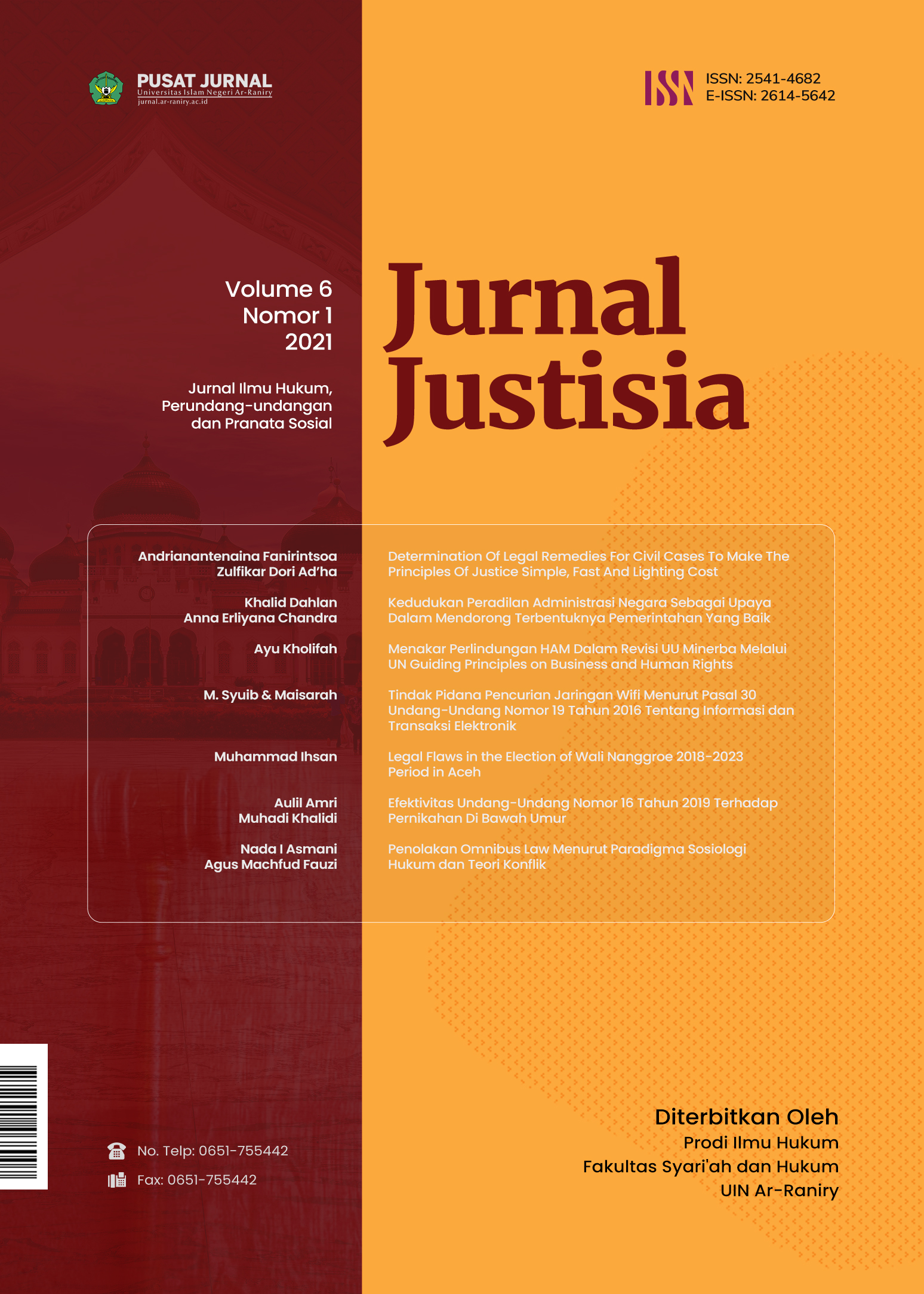Kedudukan Peradilan Administrasi Negara Sebagai Upaya Dalam Mendorong Terbentuknya Pemerintahan Yang Baik
DOI:
https://doi.org/10.22373/justisia.v6i1.10609Abstract
Efforts to encourage the implementation of proper governments are continually done in each country, including one of them in the Republic of Indonesia. A decent government can be realized if it is followed by government decisions that are responsive to the needs and interests of the community. The decision of the state administration officials in the effort to realize a proper government must be based on the general principles of good governance, especially those that have been mentioned in Act. No. 30 of 2014 concerning Government Administration. In term of realizing a proper government, it not only becomes the duty of the state administration officials through the decisions formed, but also the involvement of the community as the plaintiff for any government decision that feels disadvantaged and the state administrative court as an institution that examines and decides disputes between the community and the government by continuing to refer the laws and general principles of a good government is part of realizing a good governance.References
a. Buku
Abdullah, Ali. Teori Dan Praktik Hukum Acara Peradilan Tata Usaha Negara. Jakarta: Kencana, 2017.
Atmosudirjo, Prajudi S. Administrasi Negara. Jakarta: Ghalia Indonesia, 1994.
Azhary. Negara Hukum Indonesia. Jakarta: UI Press, 1995.
Basah, Sjachran. Eksistensi dan Tolak Ukur Badan Peradilan Administrasi di Indonesia. Bandung: Alumni, 1989.
Fachruddin, Irfan. Pengawasan Peradilan Administrasi Terhadap Tindakan Pemerintah. Bandung: Alumni, 2004.
Hamidi, Jazim. Penerapan Asas-asas Umum Penyelenggaraan Pemerintahan yang Layak (AAUPL) di Lingkungan Peradilan Administrasi Indonesia. Bandung: Citra Aditya Bakti, 1999.
HR, Ridwan. Hukum Administrasi Negara. Jakarta: Rajagrafindo Persada, 2008.
HR, Ridwan. Tiga Dimensi Hukum Administrasi dan Peradilan Administrasi. Yogyakarta: FH UII Press, 2009.
Marbun, S. F. Peradilan Administrasi Negara dan Upaya Administratif di Indonesia. Yogyakarta: FH UII Press, 2011.
Prins, W.F., dan R. Kosim Adisapoetra. Pengantar Ilmu Hukum Administrasi Negara. Jakarta: Pradnja Paramita, 1978.
Purbopranoto, Kuntjoro. Beberapa Catatan Hukum Tata Pemerintahan Dan Peradilan Administrasi Negara. Jilid II. Bandung: Alumni, 1981.
Sibuea, Hotma P. Asas Negara Hukum Peraturan Kebijakan dan Asas Asas Umum Pemerintahan Yang Baik. Jakarta: Erlangga, 2002.
Soekanto, Soerjono, dan Sri Mamudji. Penelitian Hukum Nomratif: Suatu Tinjauan Singkat. Jakarta: Rajawali Press, 2010.
Soekanto, Soerjono. Penelitian Hukum Normatif. Jakarta: PT Raja Grafindo Peresada, 2006.
Soemantri, Sri. Bunga Rampai Hukum Tata Negara Indonesia. Bandung: Alumni, 1992.
Supandi. Urgensi Reformasi Hukum Acara Perdata dan Hukum Acara Peradilan Tata Usaha Negara dalam Era Pembangunan Hukum Modern. Bandung: Alumni, 2016.
Syahrizal, Darda. Hukum Administrasi Negara & Peradilan Tata Usaha Negara. Yogyakarta: Medpress Digital, 2013.
Tjandra, W. Riawan. Teori dan Praktik Peradilan Tata Usaha Negara. Edisi Revisi. Yogyakarta: Cahaya Atma Pustaka, 2011.
Zaini, Hasan. Pengantar Hukum Tata Negara Indonesia. Bandung: Alumni, 1974.
b. Jurnal Ilmiah
Erliyana, Anna. “Implikasi Hukum Bagi Pejabat Publik Yang Melakukan Maladministrasi”. Law Review, Fakultas Hukum Universitas Pelita Harapan. Vol. Ill, No. I, Juli 2003.
Erliyana, Anna. “Keputusan Administrasi Negara (Beschikking)”. Low Review, Fakultas Hukum Univer.iitas Pelita Harapan. Vol. IV. No.3. Marei 2005.
Erliyana, Anna. Renius Albert Marvin. “Polemik Jangka Waktu Pengajuan Gugatan Ke Pengadilan Tata Usaha Negara”. Jurnal Hukum & Pembangunan Tahun ke-49. No.4 Oktober-Desember 2019.
Man Ng, Michael Chi. “Are Globalization and Governance Interrelated? Evidence among World Economies”. Journal of Globalization Studies. Vol. 7, No. 2, Nopember, 2016.
Puspitasari, Sri Hastuti. “Urgensi Independensi dan Restrukturisasi Kekuasaan Kehakiman di Indonesia”. Artikel Dalam Jurnal Hukum. No.1 Vol.14 Januari 2007.
Putrijanti, Aju, Lapon T. Leonard, dan Kartika Widya Utama, “Peran PTUN dan AUPB Menuju Tata Kelola Pemerintahan yang Baik (Good Governance),” Mimbar Hukum, Volume 30, Nomor 2, Juni 2018.
Syuhudi, Ichsan. “Implementasi Asas-Asas Umum Pemerintahan Yang Baik Di Lingkungan Peradilan Administrasi Negara”. Pena Justisia: Media Komunikasi dan Kajian Hukum. Vol. 17, No. 1, 2017.
c. Tesis/Disertasi
Azhari. “Negara Hukum Indonesia Suatu Analisis Yuridis Normatif tentang Unsur-Unsurnya”. Jakarta: Disertasi FH UI, 1993.
d. Peraturan Perundang-Undangan
Indonesia. Undang-Undang Dasar Negara Republik Indonesia Tahun 1945 (UUD 1945).
Indonesia. Undang-Undang Tentang Administrasi Pemerintahan, UU No. 30 Th. 2014, LN No. 292 Tahun 2014, TLN No. 5601.
Downloads
Published
Issue
Section
License
The Authors submitting a manuscript do so on the understanding that if accepted for publication, copyright of the article shall be assigned to Jurnal Justisia : Jurnal Ilmu Hukum, Perundang-undangan dan Pranata Sosial, Ar-Raniry State Islamic University, Indonesia as the publisher of the journal.
Jurnal Justisia : Jurnal Ilmu Hukum, Perundang-undangan dan Pranata Sosial right of first publication with the work simultaneously licensed under Creative Commons Attribution-ShareAlike 4.0 International License (CC BY-SA 4.0) that allows others to share (copy and redistribute the material in any medium or format) and adapt (remix, transform, and build upon the material) the work for any purpose, even commercially with an acknowledgment of the work's authorship and initial publication in Jurnal Justisia : Jurnal Ilmu Hukum, Perundang-undangan dan Pranata Sosial. Authors are able to enter into separate, additional contractual arrangements for the non-exclusive distribution of the journal's published version of the work (e.g., post it to an institutional repository or publish it in a book), with an acknowledgment of its initial publication in Jurnal Justisia : Jurnal Ilmu Hukum, Perundang-undangan dan Pranata Sosial. Authors are permitted and encouraged to post their work online (e.g., in institutional repositories or on their website) prior to and during the submission process, as it can lead to productive exchanges, as well as earlier and greater citation of published work (See The Effect of Open Access).

